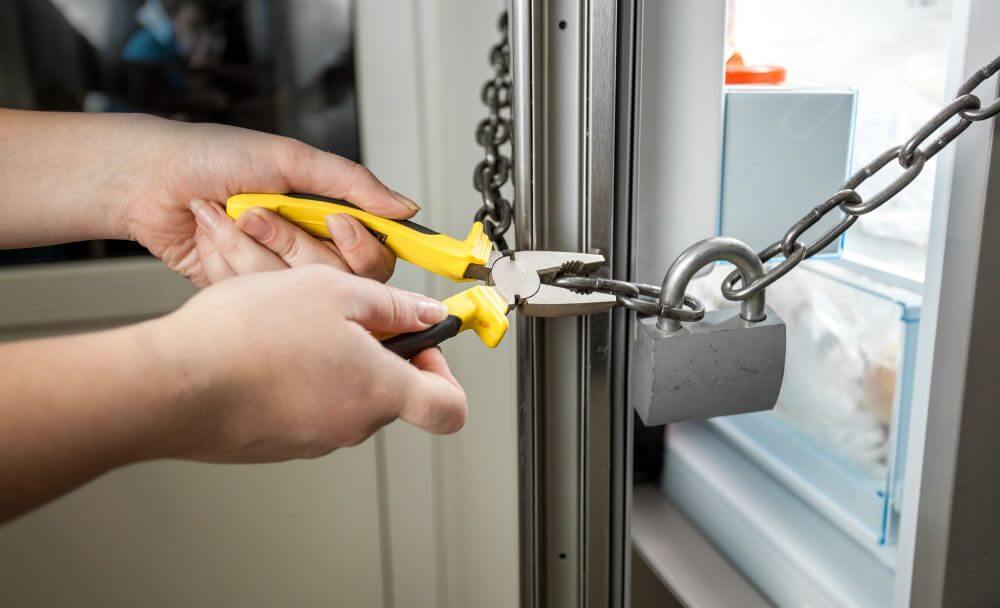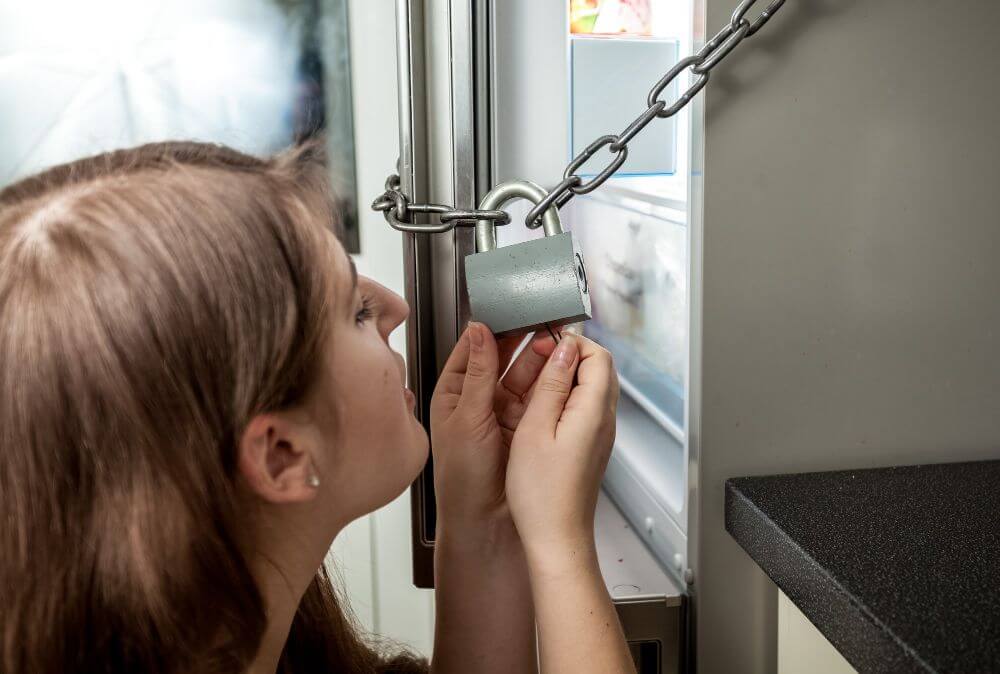Is It Wrong to Put a Lock on the Fridge?
It’s a question that has divided families and roommates for years: is it wrong to put a lock on the fridge? After all, isn’t the fridge supposed to be a shared space where everyone can help themselves to food?
There are valid arguments on both sides of the debate. Those in favor of locks argue that they help to keep food fresh and prevent waste. Those against locks argue that they’re unnecessary and inconvenient.
So, who’s right? Ultimately, it comes down to personal preference. There’s no right or wrong answer, although there are some things to consider before deciding.

Reasons you want to put a lock on your refrigerator
You might want to lock your fridge, even if it’s not the most popular decision among your roommates or family members.
1. Dealing with young kids
If you have young children in the house, a fridge lock can help to keep them from snacking too much or making a mess. It can also prevent them from eating food that they’re allergic to.
If your child is too young to understand what’s going on, it’s completely understandable that you would want to restrict their access to the refrigerator. Right or wrong, this is what works for you and your family.
2. Keeping track of food allergies
If someone in your household has a severe food allergy, it’s important to take precautions to prevent them from contacting the allergen. Locking the fridge can help to ensure that only safe foods are consumed.
Children and adults with phenylketonuria (PKU) must follow a diet to prevent brain damage. A fridge lock can help to ensure that they don’t eat foods that are high in protein and low in phenylalanine.
3. Elderly with medical conditions
If you have an elderly family member living with you, they may need to follow a special diet due to a medical condition. Locking the fridge can help to ensure that they consume only the foods that are safe for them to eat.
4. Preventing food waste
If you’re concerned about food waste, locking the fridge can help to keep track of what’s being eaten and prevent spoilage. This is especially important if you live with roommates or family members who tend to be forgetful about closing the fridge door.
5. Keeping track of diet
If you’re trying to stick to a specific diet, locking the fridge can help to prevent temptation. If you know, there’s no way you’ll be able to resist eating that pint of ice cream, and it might be best to keep it out of sight.
6. Maintaining a tidy kitchen
Locking the fridge can help prevent roommates or family members from leaving food on the counter or in the fridge. This can be a helpful solution if you’re trying to maintain a tidy kitchen.
Reasons you might not want to put a lock on the fridge.

Reasons you don’t want to put a lock on your refrigerator
Not everyone favors locking the fridge, and there are a few valid reasons why you might not want to do it.
1. Inconvenience
A fridge lock can be incredibly inconvenient if someone in your household is always hungry or forgets to eat. It’s not fun to wait for someone to unlock the fridge whenever you want a snack.
2. It’s unnecessary
Putting a lock on the fridge might be unnecessary if you live with responsible adults. After all, everyone should know not to eat food that doesn’t belong to them.
3. It could lead to arguments
Putting a lock on the fridge could lead to arguments, especially if someone in your household feels like they’re being treated like a child. It’s important to discuss with your roommates or family members before making a decision.
4. You could forget the key
If you put a lock on the fridge, there’s always the possibility that you could lose the key or forget the combination. This would be a major inconvenience, especially if there’s perishable food inside.
5. It could damage the fridge
If you’re not careful, putting a lock on the fridge could damage the door or seal. Make sure to read the instructions carefully before attaching anything to your fridge.
So, should you put a lock on the fridge?
It depends on your circumstances. If you have young children in the house, putting a lock on the fridge might be a good idea. However, if you live with responsible adults, you might not need to. Ultimately, it’s up to you to decide what’s best for your household.

Alternatives of Locking Your Fridge
As there are some disadvantages to locking your fridge, here are some possible alternatives:
1. Keep dangerous or allergenic foods out of reach
If you’re concerned about children getting into dangerous or allergenic foods, you can keep them out of reach instead of locking the fridge. This might mean placing them on high shelves or in hard-to-reach places.
2. Use airtight containers
If you’re worried about food waste, you can use airtight containers to track what’s being eaten. This will also help to prevent spoilage.
3. Put a note on the fridge
If you want to remind people not to eat certain foods, you can put a note on the fridge. This is a less aggressive way to keep track of diet or prevent temptation.
4. Talk to your roommates or family members
If you’re having trouble with someone in your household not closing the fridge door, try talking to them about it. They might not be aware of the issue, and a conversation could help to resolve the problem.
5. Keep the fridge organized
If you’re struggling with a messy fridge, try to keep it organized. This will make finding what you’re looking for easier and prevent food from getting lost in the shuffle.
6. Invest in another fridge
You can always invest in another fridge if you have the space and the budget. This can be a good solution if you have multiple household members with different eating habits.
Is It Wrong to Put a Lock on the Fridge: Final Words
Putting a lock on the fridge is a personal decision. There are some advantages and disadvantages to consider before making a decision. Ultimately, it’s up to you to decide what’s best for your household.
We hope this article was helpful. If you have any questions or comments, please feel free to reach out to us.





